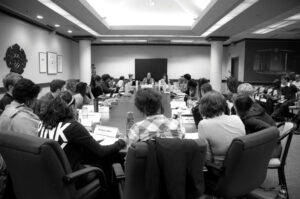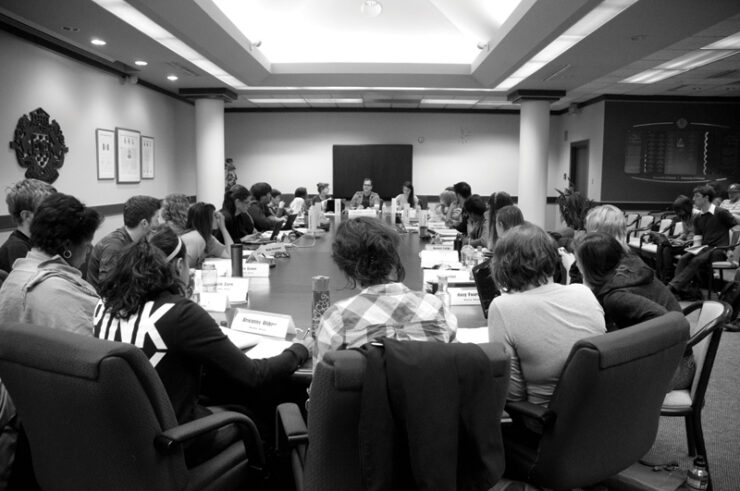
THE BOARD OF Administration (BOA) sat on Sept. 18 for their first official meeting of the semester. It was also the first meeting headed by Dave Molenhuis, the new BOA chair. The Fulcrum took a look at the two motions that made amendments to the Student Federation of the University of Ottawa’s (SFUO) constitution.
Tiebreak vote removed
Sarah Jayne King, vp finance of the SFUO, put forward the first motion of the meeting, which called for the removal of the SFUO president’s tiebreaking vote during BOA and SFUO meetings.
“If there literally is a tie, the president has an extra vote on top of the vote they had already cast,” said King. “Essentially what this motion does is remove that power from the president.”
“[The motion is] acknowledging that the president is elected by the same students and represents the same number of students [as other executive members]. They do not have an extra power in decision making at the board.”
Brendon Andrews, BOA representative for social sciences, disagreed with the motion, voicing his concern during the debate period.
“If you choose to say that the president doesn’t get the deciding vote, you are deciding that a motion does not pass,” said Andrews. “Basically, you are saying that the motions don’t get passed along when this could be an important motion.”
Other board members spoke in favour of the motion, hoping the removal of the presidential veto would encourage cooperation between members as opposed to the president making a final decision on behalf of many.
Amalia Savva, president of the SFUO, also spoke in favour of the motion.
“At the executive level, it is important for [the] executives to try and find consensus when we meet and make decisions,” she said after the meeting in an interview with the Fulcrum. “Decisions of the executive affect a lot of the day-to-day things of the student federation. It is important that as an executive we’re strong and united when it comes to making decisions.”
“I think it is really good that one person doesn’t have a higher power than everyone else,” she continued. “One person having the ultimate say … I think that is wrong.”
After some discussion, the motion carried 29 to one, with Andrews voting against the change.
The end of the SAC
Sarah Jayne King put forward another motion on behalf of the ad-hoc Constitutional Committee that recommended the abolishment of the Student Arbitration Committee (SAC). The committee served as an unbiased party, interpreting and reviewing the laws that govern the board and the executive, as well as launching investigations and implementing sanctions when necessary.
“The Student Arbitration Committee is something over the past three years we haven’t seen properly filled,” said King. “SAC is an undemocratic body that is not actually accountable to the SFUO in any legal sense and can literally overturn the elections or a referendum process with two people,” said King.
“What this motion has done is removed the SAC and put in place a Constitutional Committee as a standing committee that would take on many of the same powers, but be a committee of the board.”
The Constitutional Committee would be made up of five SFUO directors chosen by the BOA and two alternate members from the BOA in the case of a conflict of interest.
Brendon Andrews, BOA representative for social sciences, spoke out against the motion and argued for maintaining the SAC.
“The board in general has been moving the power structure [and] augmenting it in a way that makes it less inclusive. They use things they haven’t done successfully in the past as reasons for changing the structure and I don’t think that’s right,” said Andrews.
“We can’t use the same people [who are] making the rules. There are systems of checks and balances that have been created in western economies for a reason. It will create a biased system if we don’t [have the SAC].”
Members of the BOA argued there was a need for greater democracy with regards to the SAC and that appointments were not in line with a spirit of the SFUO constitution. They claimed having elected members fill such a committee will serve in the best interest of the students who elect BOA and SFUO members every year.
“As board members are democratically elected by students, the board will decide which of those students will sit on this committee. Just like other committees of the board, [they] will be able to make decisions when it comes to constitutional changes that might need to be made or in the case of an impeachment,” said King.
Amendments were made to the motion after much debate and confusion over its wording. The motion carried 29 to one; only Andrews voted against it.
—Christopher Radojewski




